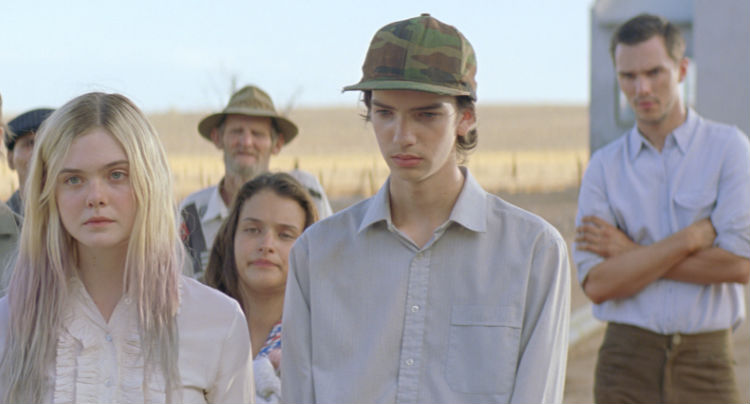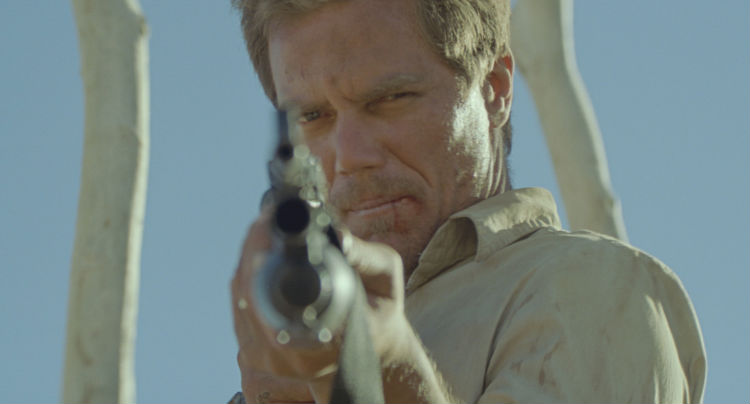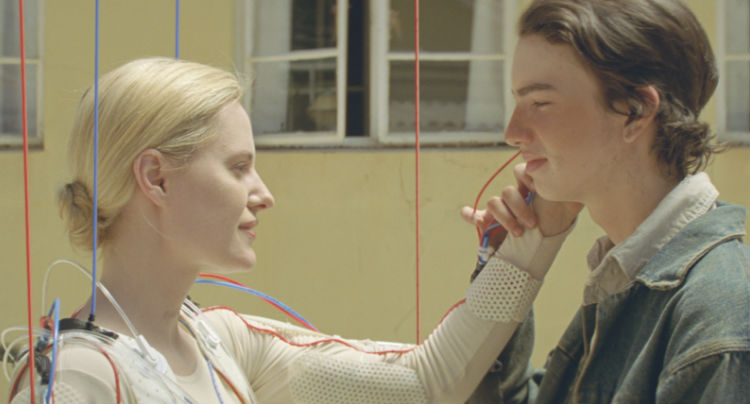Jake Paltrow On The Difference Between Personal and Autobiographical Filmmaking

The styles of post-apocalyptic sci-fi and dustbowl Western collide in Jake Paltrow’s Young Ones, a tragic, imaginative story of a family struggling to survive in a dry world where water is as hard to find as virtue. Michael Shannon stars as Earnest Holm, a survivor and a farmer doing his best to raise his children Jerome (Kodi Smit-McPhee) and Mary (Elle Fanning) the right way, though a handsome scoundrel named Flem (Nicholas Hoult) threatens to take everything Earnest has left.
In our chat with Jake we discuss the myriad inspirations he took for the film, bringing robot dogs to life, how the film isn’t technically post-apocalyptic, the great Michael Shannon, and much more.

How long has the idea for this film been in your head? It’s pretty unique.
Jake: Oh gosh, a long time. It’s been, like, five years from beginning to now. Initially, it really started with the father-son love story and wanting to explore that. There’s a lot of my dad in the Earnest character. He died young, and I hadn’t written anything about him. I wanted to see what that would feel like. It felt sort of sweet and nice, but also dark and tragic. It started there. I reread the S.E. Hinton books–The Outsiders, Rumble Fish–and I really wanted to do a story about kids in an environment like this, sort of imagining what a science fiction book written like her would be like. I approached it like an adaptation of an S.E. Hinton science fiction story. Those don’t exist, but I was imagining that. I wanted to keep those literary devices in the movie so that it wouldn’t feel realistic, in a funny way. I feel like I was trying to find the fine line between making it naturalistic but not realistic.
There’s a fun mixture of sci-fi post-apocalypse and Western in the film that works very well.
Jake: To me, the film isn’t post-apocalyptic at all. It’s an environmental disaster, a man-made thing. It’s an extrapolation of something we’re dealing with right now in California. When you bring the politics of how we got here into it, it’s not that implausible that we could end up in a situation like that. It’s not like the entire world is in drought, it’s just this area. In the urban cities in this movie, people are falling in love with their operating systems and have perfectly functioning lives. But the people who don’t have a lot of money and are suffering the worst of these environmental calamities are the people we’re focusing on in this movie.
I love independent sci-fi movies because it forces filmmakers to be disciplined about their special effects. I love the way you implemented yours.
Jake: Thank you. We really had to prepare to ensure we could get this finished with a very low budget. At the same time, I wanted to have ILM-level visual effects, which I think we achieved.
Talk about that robot. It’s an incredibly convincing creation.
Jake: It was inspired by the Boston Dynamics robot Big Dog. When I first got the idea for the movie, I saw that video, and it had such an emotional quality without being alive. There was something about it…I couldn’t put my finger on it, but it was very emotional. I got really excited about putting it in the movie, and I spent time with people at Boston Dynamics. We really did try to make it work so that Big Dog was in the movie, but they had a lot going on, so it wasn’t really possible at the time. The way we did it was, it was part puppetry and part CGI. The thing that I really wanted to achieve most was the effect where the actors could really put their hands on it and it wouldn’t all feel like it was just an animated foreground effect. We were able to do that.
It was bugging me. I kept trying to figure out whether what I was seeing was practical or CG, and it was pretty much impossible.
Jake: Thank you.
Michael Shannon and Kodi Smit-McPhee are great together.
Jake: My favorite scene is when they’re taking apart the defunct water well and they start play fighting, which is sort of very rough. That’s something that comes from my dad, and I really liked that. It’s a personal thing, and they did it so perfectly. Kodi shows how scrappy that character is, and Mike is so good at playing this compassionate tough guy. That’s probably my favorite moment between them.
I was impressed with Nicholas Hoult because he’s such a likable guy when you see him, but he plays a great villain in your film.
Jake: The character is so complex, and I think that’s a great testament to Nick. I think he made Flem infinitely more complex than he was on the page. Flem was written as a more traditional bad guy, and as we tailored it to him, he brought a complexity to it that made it much better.
You said that this film is a very personal one, a lot of it inspired by your late father. Is that a comfortable thing to do?
Jake: There’s a difference between personal and autobiographical. There’s nothing in the movie that’s autobiographical at all. But there are moments and emotions that I feel close to. When you’re making a movie, there is an element that should be personal and should be confessional. I’ve always gravitated toward those kinds of films as a fan. I just do that intuitively as a filmmaker I guess.
Young Ones is for fans of…what? Who would you recommend it to?
Jake: I like lots of different things. I wouldn’t limit it to film fans. A big part of what I built this movie from is my love of anime and manga comics. Neon Genesis Evangelion was one that always meant a lot to me. A lot of inspiration for Jerome and Ears, the girl across the border is His and Her Circumstances, which is a great anime that I really like. There are a lot of people out there that like sci-fi movies, but also find themselves surprised by these character-based things. I think our film falls into this place where you can have the experience of a genre picture, but at its core, it deals with some larger, interpersonal family issues, and not in a pandering or sentimental way at all.
Speaking of not pandering, you leave a lot to the imagination and make us work a bit as an audience.
Jake: I feel like there are certain things we rely on in certain kinds of movies that move away from authenticity. For me, as an audience member, when I see those things, it loses me on the things I do love about it. An example in this movie would be that the end of the movie isn’t Jerome and Ears getting together. That romantic experience of going across the border and meeting the girl that his father mentioned…that’s enough. It always makes me think of Citizen Kane. At the beginning, he says, “I saw a woman through the window of a subway 50 years ago, and not a month in my life goes by that I don’t think about her.” Those moments in our lives are so monumental that it doesn’t need to culminate in marriage or sex. It can just be a meeting or flirtation that stays with you for the rest of your life. For me, that has an emotional relevance that means something to me. In most movies, the reward for this boy going through all this hardship would be for him to get the girl. That’s stuff that I don’t really gravitate toward.

There’s a great visual arc to the film. At first, we’re in a dry, sun-drenched desert, but later in the movie we see an urban environment that feels like a new world.
Jake: Yes, that urban environment is to show that there’s this commercial prosperity in the state next door, that they’re not suffering the way the Holm family is. We talked about the stages of hydration within the environment. Obviously everybody is really suffering at the beginning of the film and sort of dehydrated, and that adds to this heightened emotional state. The idea is, the first stage of the water pumping is this artificial stage where one of these aqueducts has been run toward the farm, so there’s water to irrigate a small portion of the land. There’s water to bathe and water to drink, so we start to see a vibrancy in the skin and in the land they live on. But when the rain starts falling, we can start brining reed clothes into it. We follow an organic way to bring a lushness into the film.
I look forward to your next feature, but I hope we don’t have to wait so long in between!
Jake: Me too. This one took much too long. I definitely won’t be letting that happen again. I’m working on my next project now, and it’s in this same vein, but in a more urban environment. It’s around a similar time frame and has a science fiction element to it. It’s maybe in some ways even more ambitious. I hope to have it finished as soon as possible.
